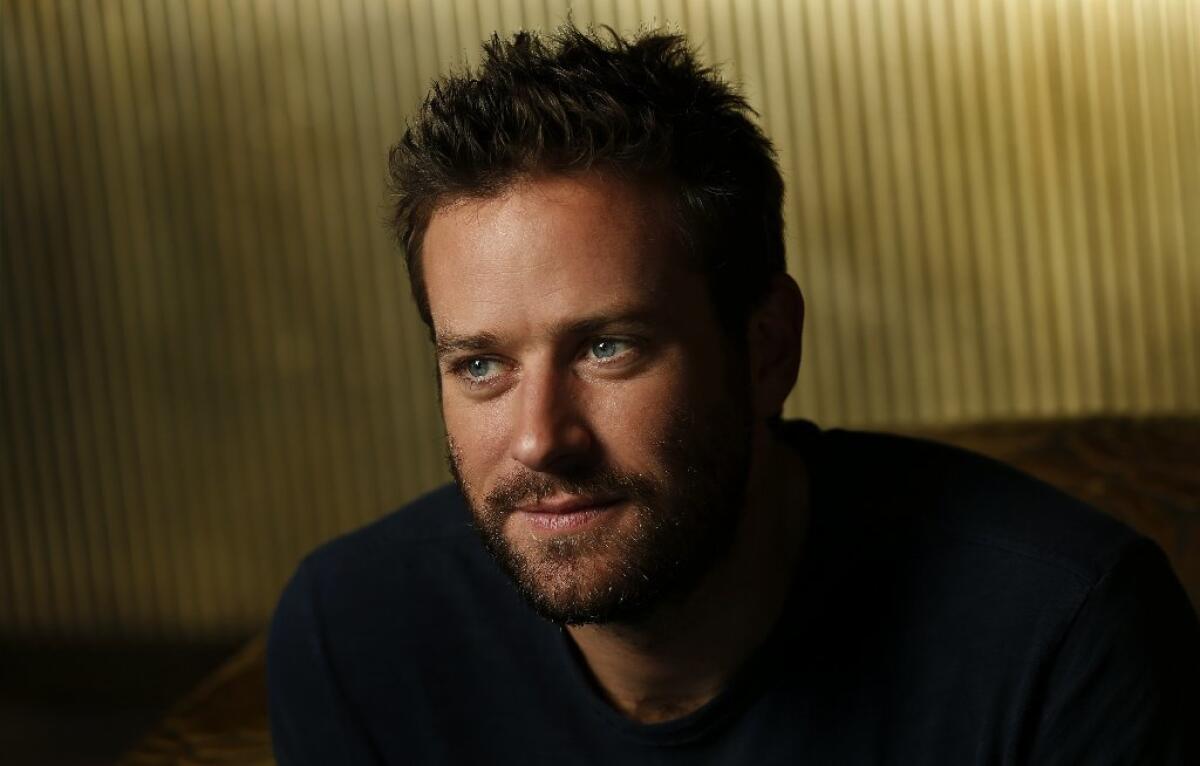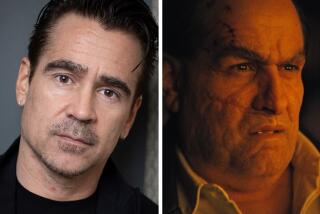Armie Hammer is grateful to have touched lives with ‘Birth of a Nation’

Tall, handsome and well-spoken, the man looks as if he were designed in a lab, complete with rich baritone. That might be why he likes playing such total bastards onscreen.
“Hopefully it’s not an example of art imitating life,” says Armie Hammer, flashing a million-dollar smile in a lounge at the Soho House West Hollywood. After a run of good guys in big-budget studio movies (“The Lone Ranger,” “The Man from U.N.C.L.E.”), he says he looked for more nimble indies to rev his acting motor. He estimates he shot seven projects in the year that produced “Nocturnal Animals,” in which he is a charming cad, and “Birth of a Nation,” in which his charms are not on display as a struggling, rotten-toothed slave owner.

Watch the trailer for ”The Birth of a Nation.”
When Hammer got the script for “Birth,” the Nat Turner slave revolt chronicle that repurposes the title of one of cinema’s most revolutionary — and racist — cornerstone works, he was immediately intrigued.
“By the way, if it was handed to me now, post-election, I’d be saying, ‘They’re actually remaking “Birth of a Nation”!’ ” Hammer laughs darkly over a Guinness. “But I saw that script and said, ‘This guy’s gonna stir up some ...!’ ”
Hammer met with star/producer/co-writer/first-time director Nate Parker to measure the cut of his jib.
“He radiated energy, this tenacity,” he says of Parker. “He is the dog in the fight that won’t quit. Just to hear the narrative of how he’d been working on this script for eight years — and his fire had not dimmed at all. I was, like, ‘Dude, whatever you’re doing, I’m in.’ ”
Hammer wasn’t familiar with Turner’s bloody revolt.
“It’s a dangerous idea, and it’s also, by the way, an extremely American idea, rising against tyranny.”
He burrowed into a character whose actions are flatly repugnant. The film doesn’t excuse Sam Turner’s inhuman treatment of slaves. However, the hollow look in his eyes speaks to his desperation.
“Sam Turner, in the 1830s, would have been raised by one of the most progressive families out there,” says Hammer. “They taught Nat to read, which was illegal. So he was raised to be a good person in probably as … a time as has existed in American history.
“Sam owns Nat, he can make him do whatever he wants. He pimps out one of his slaves’ wives. But it starts out and he’s a kid, playing with Nat — plantation owners’ kids and slave kids would play together. So that’s how their relationship started, but it has the unfortunate timing of being in a socioeconomic and political system that polluted and corrupted everything it touched.
“Whereas Hutton,” he says, pivoting to the philandering husband in Tom Ford’s less bloody but somehow equally brutal “Nocturnal Animals,” “grew up wealthy, accustomed to getting everything he wanted, whether it be going to this school, getting this girl, even a girl who was married and pregnant at the time. But as soon as he gets what he wants, he’s bored. He has an insatiable appetite for the chase.”
Despite his limited screen time, Hutton’s actions don’t come out of nowhere. A cold kitchen scene with wife Susan (Amy Adams) depicts how empty their relationship has become.
“There was little opportunity to put history between these characters,” Hammer admits, “but you go, ‘I see how this marriage has grown into this loveless state.’ How does that weigh on someone if you’ve lived that for years?”
Hammer is excited for the spring release of “Free Fire,” a chamber crime piece with humor in which he plays a touched vet on the edge of a shootout and co-starring Sharlto Copley and Brie Larson, and for the chance for his fried-but-sly character Ord to get out there. But it’s clearly “Birth” that lingers with him — and the people he meets.
“The other day, coming through the airport in Dallas, I was going through the security line and there was this TSA guy, an older gentleman, as I walked by, he leaned over and said, ‘Thank you.’ I said, ‘For what?’ He said, ‘I saw “Birth of a Nation” and I wanted to thank you for making that movie.’ It was an older African American gentleman. That’s worth more to me than anything else. That’s the great currency of making movies.”
See the most read stories this hour »
More to Read
From the Oscars to the Emmys.
Get the Envelope newsletter for exclusive awards season coverage, behind-the-scenes stories from the Envelope podcast and columnist Glenn Whipp’s must-read analysis.
You may occasionally receive promotional content from the Los Angeles Times.







